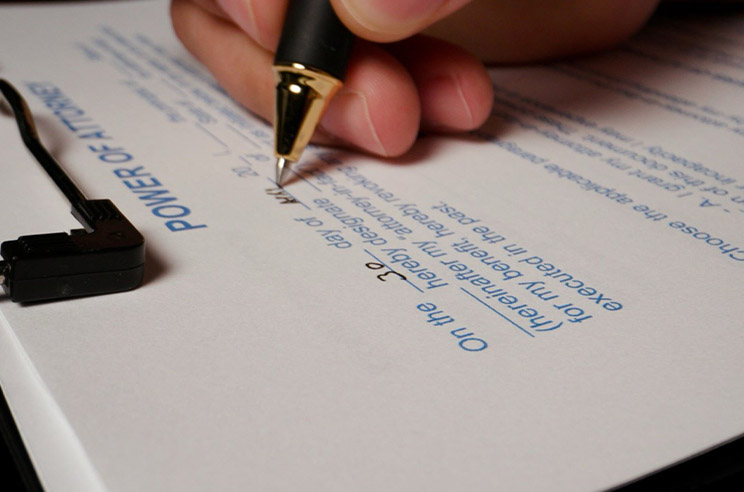Takeaways
- A durable power of attorney is a legal document that allows a trusted individual to make financial or health care decisions on your behalf if you become unable to handle your own affairs.
- This document provides long-term safeguards, ensuring your affairs are managed without court intervention.
Though you are likely in good health now and can handle your own financial transactions and health care decisions, there is always a chance you could lose that ability. It could happen suddenly, as with a car accident, or gradually, as with dementia. Planning for the possibility of incapacity is an important part of estate planning. Elder law attorneys call this “long-term care planning”.
In creating an estate plan, your attorney will ask you to nominate people you trust to make financial and health care decisions on your behalf if you ever become unable to do so. Your completed estate planning packet will likely include two different documents addressing these decisions: one document will be for legal and financial matters and the other for medical treatment decisions. These documents are both power of attorney documents.
A power of attorney (POA) is a legal document that allows an individual (known as the principal) to give another person, an “Agent”, sometimes referred to as an “Attorney in Fact”, the authority to act on their behalf. Though many people are familiar with the general concept of POAs, not everyone understands the different types of powers of attorney and how they work, especially regarding durable powers of attorney.
What Is a “Durable” Power of Attorney?
Powers of Attorney have existed for hundreds of years, originally as part of English common law, and subsequently as part of our written statutes. Ironically, at common law, a Power of Attorney became invalid if the principal became incapacitated (unable to make or communicate decisions). Yet that is the very reason why most persons need a Power of Attorney. To prevent invalidation of the power, one had to expressly indicate in the document that it was “durable”, meaning it remained valid even if the principal (the person granting the power) became incapacitated. Today, Powers of Attorney are governed by statute and remain valid despite subsequent incapacity of the principal. But just to make that clear, financial Powers of Attorney continue to expressly indicate that they are “durable”.
Durable “General” Powers of Attorney are commonly used in estate planning, long-term care planning, and financial management. They give family members and trusted individuals the legal authority to step in when needed without having to go through lengthy court proceedings. Because the Agent may have broad powers, choosing the right person is crucial. Abuse of POA authority does happen, so it’s very important to select someone trustworthy. George Vasiliadis, an attorney with the law firm of Vasiliadis Pappas Associates, notes, “It is better not to have a POA if there is no one trustworthy to select as your Agent”.
When creating an estate plan, some people will choose different trusted individuals for their durable general (financial and legal) POA and their durable health care (medical) POA. Making this distinction can help spread the responsibilities among different trusted people. This strategy also considers that some Agents would be better at handling financial decisions and others better with medical decisions.
Special Power of Attorney
A “Special Power of Attorney” (also sometimes referred to as a “Limited Power of Attorney”), as distinguished from a “General Power of Attorney” is a limited grant of authority for a specific purpose or purposes. Examples include the paper you sign at the bank to authorize someone to handle transactions involving a bank account; or a paper you sign authorizing your stockbroker to transfer or liquidate specified securities.
Common Uses for Durable Powers of Attorney
A Durable General Power of Attorney can cover a wide range of decisions, depending on how it is written. Some common uses include:
- Decisions regarding financial affairs. Paying bills, managing investments, handling tax returns, and maintaining bank accounts.
- Real estate transactions. Selling, buying, or managing property if the principal cannot handle the paperwork.
- Health care decisions. When paired with a health care power of attorney, the Agent may make medical decisions if the principal is incapacitated. Contrary to general practitioner attorneys and traditional estate planning attorneys, elder law attorneys prefer to draft a separate Power of Attorney for financial affairs, another separate Power of Attorney for health care matters, and a separate Living Will to indicate wishes in the event of end-stage terminal illness when a person cannot make or communicate decisions.
- Legal matters. Signing contracts or managing lawsuits on behalf of the principal.
Things Many People May Not Know About Powers of Attorney
Despite their importance, POAs are often misunderstood. Here are some good things to know about them:
- They can be as specific as you want. As explained earlier, a POA doesn’t have to grant blanket authority. It can be tailored to cover only certain actions, such as managing a single bank account or selling one piece of property.
- They can become effective immediately or upon one’s incapacity. POAs are generally effective as soon as they’re signed. The Agent remains available to step in if needed. Sometimes, a POA specifies that it does not become effective unless the principal becomes incapacitated. These are referred to as “springing” POAs – they spring into effect upon a Principal’s incapacity. While a “springing” POA may seem to be good to have, in practice, they often create problems because of reluctance of financial institutions and others to honor the Agent’s authority. Notes Dionysios Pappas, an attorney with the law firm of Vasiliadis Pappas Associates, “If you trust someone to act as your Agent, then you don’t need a springing POA. If you are afraid your Agent will use the POA in ways that you disapprove, then that person should not be selected as your Agent”.
- They end upon the principal’s death. A durable power of attorney does not replace a will. Once the principal passes away, the agent’s authority under the DPOA ends and the executor named in the principal’s will takes over.
- Most Durable General Powers of Attorney are inadequate for long-term care planning. Unless drafted by an elder law attorney who does Medicaid planning, almost no POAs contain provisions necessary to enable your Agent to take actions necessary to implement an asset protection plan.
Why Everyone Should Consider Having a Durable POA
No one likes to think about losing the ability to manage their own affairs, but the reality is that accidents, illness, or aging can leave anyone vulnerable. Without a Durable General Power of Attorney in place, family members might have to go to court to be appointed as a guardian, a legal process that can be expensive, stressful, and time-consuming.
A Durable General Power of Attorney helps ensure that someone you trust is legally empowered to step in when needed, keeping your finances, medical care, and personal matters on track.
The elder law attorneys at Vasiliadis Pappas Associates have extensive experience in using powers of attorney to assist persons with their estate and long-term care planning needs. Call us. We can help!







